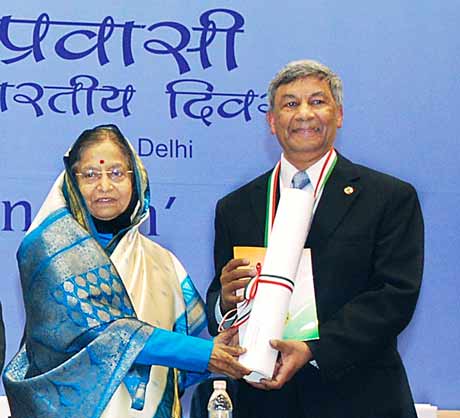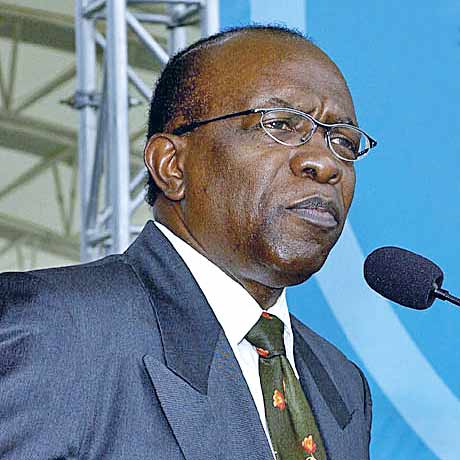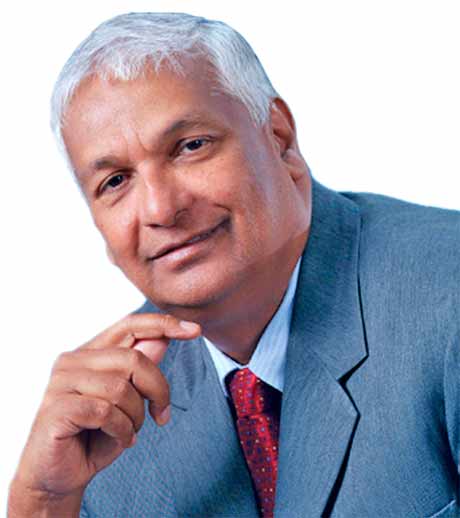Kolkata Memorial inaugurated

Guyana-born Ashook Ramsaran, Vice President of GOPIO, whose efforts and persistence led to the Kolkata Memorial becoming a reality, stands beside the landmark structure after its inauguration on January 11, 2011. Ramsarran received the Pravasi Bharatiya Divas Samman Award, India's highest honour given to a PIO.
On January 11, 2011 at Kidderpore Depot along the Hoogley River in Kolkata, a Memorial in honour of those who left the shores of India between the years 1834-1920 was inaugurated by the Hon. Vayalar Ravi, Minister of India’s Overseas Indian Affairs. The event was attended by several hundreds with representation from many of the countries to which the original émigrés and their descendants were domiciled, including Guyana, Trinidad, Surname, Guadeloupe, USA, Canada, UK, Netherlands, Switzerland, South Africa, Kenya, Fiji, Mauritius, Re-Union Islands, New Zealand and Australia.
The Kolkata Memorial is inscribed with a plaque (in English and Hindi) as “recognition and remembrance of their journeys as Indian indentured laborers to far away lands seeking better livelihoods for themselves and their descendants; for their pioneering spirit, determination, resilience, endurance and perseverance amidst the extremely harsh and demeaning conditions they encountered; for their preservation of sense of origin, traditions, culture and religion, and their promotion of the Indian culture; for their achievements and successes despite insurmountable odd”.
The inauguration and unveiling was a solemn and emotional event touching the hearts of many who came from far off countries. The delegations from Mauritius and Re-Union Islands sang familiar and expressive songs, showing their thankfulness for being present on such a historic occasion.

The Kolkata Memorial project has significance to millions of descendants of those who left India as indentured laborers from 1834 through 1920. The plan to begin with the installation of the inauguration plaque on January 11, 2011 followed by a memorial museum and resource center, has been received with overwhelming and enthusiastic support from all corners of the globe where Indians are settled, in particular from persons of Indian origin (PIOs) in destination countries where Indian indentured laborers emigrated.
The Memorial was the brainchild of Guyanese born Ashook Ramsaran who, as Executive Vice President of the Global Organization of People of Indian Origin (GOPIO International), worked closely and continuously with the Ministry of Overseas Indian Affairs to draft the inscription and design of the plaque. The Government of India accepted the proposal and the memorial monument was erected with the inscription plaque. The tribute contained in the inscription are the words written by Ramsaran who has captured the shared sentiments of the descendants of those indentured laborers.
“This will be a lasting legacy for present and future generations of their descendants”, remarked Ramsaran.
"A noble effort indeed", said writer and historian Dr Anand Mullo of Mauritius."
"An extraordinary service to the Indian Diaspora", said Indian emigration roots researcher Shamshu Deen of Trinidad & Tobago."
"A commemoration tribute whose time is overdue", said Prof Mohan Gautam of The Netherlands."
"We are all deeply indebted for the Kolkata Memorial which is a tremendous achievement", said prominent Indo-Caribbean Diaspora icon (Dr) Yesu Persaud of Guyana.
A visibly moved Ramsaran said he felt honored and privileged to be actively working to see the Kolkata Memorial become a reality.
"I have remarked previously that our ancestors who left those shores truly deserve their place in the annals of Indian history and the journeys of people of Indian origin. We owe them due recognition and a lasting remembrance – and that is what the Kolkata Memorial will be."
He said the vision of "a single, suitably significant place of emotional and physical connection for the descendants of indentured workers is finally becoming a reality.”
Prior to the inauguration of the Monument, at the conclusion of the PBD2011 events on January 9, 2011, India conferred the prestigious Pravasi Bharatiya Divas (PBD) Samman Award to 14 Persons of Indian Origin (PIO) drawn from all regions of the world and prominent among them was Ashook Ramsaran.
The annual PBD Awards were presented this year by India’s President Pratibha Patil at a widely attended ceremony.
This year’s honorees included Governor General Sir Anand Satyanand of New Zealand, the Chief Guest, who delivered the feature address to this year’s ninth annual Indian Diaspora Conference. The NZ Governor General spoke of his ancestors who left India seeking better lives in Fiji and then moved to New Zealand where he rose to the country's highest office.
The Pravasi Samman Award is the highest Government of India award given to a foreign based person of Indian origin and has been given annually over the last nine years. The award is given to outstanding overseas-based Indians who distinguish themselves to enhance India’s image and prestige while helping their community.
Ramsaran joins a small group of honorees from Guyana to receive the award among whom are President Bharrat Jagdeo, industrialist Yesu Persaud, retired cricketer Rohan Kanhai, and former Commonwealth Secretary General Shridath Ramphal. A few others from the Caribbean region (Suriname and Trinidad) have also received this coveted honour. Ramsaran is a fourth generation Indian whose great grandparents were indentured to Guyana (1853 and 1860). His grandfather and father were “drivers” on the sugar plantations. Ramsaran worked as a teacher in Black Bush Polder and in the New Amsterdam magistrate’s courts before he emigrated in 1968 to New York to pursue tertiary education. He earned his BSEE and MSEE degrees at the Polytechnic University in New York. He was an electronics engineer and progressed rapidly to the position of Vice President of Engineering in an international communications company before establishing Ramex, his own electronics manufacturing enterprise in New York. Ramex is named among the Top 100 Indian Owned Businesses in USA for 10 consecutive years. Ramsaran is married to Camille Ramgadoo of Bloomfield and is the father of two sons, Arnold and Gerald, both residing the in the USA. He is also the grandfather of Jaden (6) and Gavin (3).
Ramsaran has extensive interests in connecting the global Indian diaspora and is very active in philanthropic and charitable work in the United States and globally. He has a long record of service to the global Indian community. As Executive Vice President of the Global Organization of People of Indian Origin, he has helped to build closer links between India and the entire Indian diaspora. At the same time as an integral part of GOPIO, he has helped to promote India’s causes and concerns in a tangible way in the United States while seeking redress on issues and concerns of Indians living outside of India.
Asked about how it feels to be accorded such a prestigious award Ramsaran remarked that it is "a special honor to be recognized as such."

Special to Indo-Caribbean World
Port-of-Spain - Evidence of cracks in the alliance between the People’s Partnership and the Congress of the People appeared early in the new year when Jack Warner told the media the COP’s methods of strengthening the party were wrong.
Warner, who is chairman of the United National Congress, regarded as the leading party in the PP government, and is also Minister of Works and Transport, said on January 1 at a New Year’s Day function held at his Arouca home that members of the COP were opposing the PP government and were embarrassing their political leader, Winston Dookeran.
Five political entities joined forces before the May 24 general election to form the PP: the UNC, the COP, the Movement for Social Justice, the National Joint Action Committee, and the Tobago Organisation of the People.
Warner called for an urgent meeting of the leaders of the PP. The meeting was held on January 10.
Party chairmen made recommendations to bolster the PP, but few details were released at a post-meeting press conference they held at the Diplomatic Centre, St Ann’s.
COP chairman Joseph Toney said any follow-up meeting among the chairmen of the five political parties that comprise the PP would depend on directions from those leaders.
The MSJ’s David Abdulah, who chaired the meeting, said all is well with the ruling PP.
“We had an excellent meeting. We are very confident of not only the strength, but the unity of the People’s Partnership, and our recommendations... are going to see the Partnership sustain itself, and grow from strength to strength in the days and weeks ahead,” Abdulah said.
Asked about recommendations that included a mechanism for the parties to talk and resolve differences, Abdulah said: “When the political leaders have signed off on the recommendations and we announce, then everyone will know what we have discussed. We are not at liberty at this point in time to say what are our recommendations.”
He added: “What we want to assure you... the members of our respective parties and citizens of Trinidad and Tobago, is that we are very, very confident about the strength and unity of the Partnership and about the sustainability of the Partnership going forward.”
Not only have there been reports of COP and UNC constituency executives at loggerheads in such constituencies as Tunapuna, for which COP leader Dookeran is the Member of Parliament, but Warner has complained of the COP opening an office in Fyzabad, which is a UNC stronghold.
He suggested that the COP should seek to establish its presence in such constituencies as Diego Martin East, Diego Martin Central, or Diego Martin West, which are strongholds of the Opposition People’s National Movement.
Warner said of the COP’s methods of strengthening the party: “For me, something is fundamentally wrong with that, particularly at this point in time, not only because of what they are doing, but the way it is being done. They, in my humble view, they are opposing the Partnership government with almost every issue and they are embarrassing their leader most times. I think that is wrong and I think that needs to be corrected.”
Warner added: "(Dookeran) in many ways, in my humble view, I don't think he knows sometimes these things that are happening and, in a real sense, he's caught up between the devil and the deep blue sea, but I could be wrong. There are one or two guys in the COP who are driven by all kinds of motives except unification, and this has to be corrected.”
The COP, which is regarded as the second strongest party in the Partnership, emerged out of the May 24 general election with six seats. It failed to capture any seats in the first general election it contested in November 2007.

Now almost eight months now in government, comparisons are being made between the PP and the COP and the National Alliance for Reconstruction.
The NAR was the governing party in Trinidad and Tobago between 1986 and 1991. It was founded in 1986 out of an accommodation between the National Alliance (consisting of the United Labour Front led by Basdeo Panday, the Democratic Action Congress led by Arthur NR Robinson and the Tapia House led by the late Lloyd Best, and the Organisation for National Reconstruction, led by Karl Hudson-Phillips.
In 1988, the party split with six MPs, Panday and five other former ULF members, forming the United National Congress. Another five MPs defected to the Independent benches. Despite surviving the attempted coup of 1990, the NAR was defeated in the 1991 general election, winning only two seats.
Amidst concerns that political history could repeat itself, COP MP Anil Roberts, who is now Minister of Sport, is interested in ousting Dookeran as political leader of the COP.
Roberts, the MP for D’Abadie/O’Meara, said it’s time for the COP to get its act together.
Roberts owned and operated a bar called Spalk, a combination of sports and talk and which was based on a television talk show of the same name he hosted prior to running for office.
Earlier this month, Roberts indicated he’s willing in leading the COP if he gets the mandate of the COP membership. The leadership of the COP is up for grabs in March 2011.
"If people on the ground would like me to, I would never shirk my responsibility and I am not afraid of anybody nor any responsibility, so if my membership across Trinidad and Tobago would like me to, I will accede to the request. Of course, I will be privileged and honoured," Roberts said on January 7.
He pointed to divisions in the COP, adding that there are likely to be movements in its leadership at the party’s internal elections.
"Yes, it definitely will because we cannot continue to go on like that, because members who have worked hard, who believe in the COP, the leader and its policies, are not being given guidance and leadership," he said.
Robert said some members have lost faith in Dookeran's leadership, predicting that he would have a fight on his hands at the party's elections.
Roberts leveled blame against four members of the party for causing the divisions within the COP, saying that they were speaking out against the government without facts.
"The UNC appears to have strong leadership and discipline, the MSJ, the TOP and NJAC. In the COP there are certain members who have been given certain positions of high office who seems to be making irresponsible, unnecessary, selfish and uninformed attacks on the Prime Minister and the People's Partnership government," he said.
"When I read deputy political leader of the COP, Robert Mayers, on New Year's day, saying the People's Partnership government has no plan, what is he talking about—because he is a strong member of the Partnership, he's an economic policy member, he's an adviser and a confidant of Mr Winston Dookeran, the leader of COP who is instrumental in the plans and the visions of the Partnership. It appears he has his own selfish agenda, he has no information and he's not making statements based on fact," he said.
Roberts was also critical of COP executive Vernon de Lima, who has said the PP had no clear plan to fight crime, which has been a major issue before and since the general election.
He said de Lima was critical of the Minister of National Security, saying he was not doing his job and that the crime plan presented by the COP was being overlooked.
He said Dookeran should take disciplinary action against members who made false statements.
Dookeran, an economist who has a reserved, cool demeanour compared to Roberts’ more boisterous personality, is not troubled by the criticisms being hurled at him, either as Minister of Finance or as COP leader.
Dookeran has been severely criticised for his slow handling of payments toward policyholders of cash-strapped Clico, a subsidiary of CL Financial. He has said he is not perturbed by moves to contest his political leadership of the COP.
"I will not engage in such frivolities. There are major issues to deal with in the country," Dookeran said on January 7, in response to Roberts’ statements about the COP and its leadership.
"You remember when Gandhi was spat on in the train in South Africa and the people asked (him), 'Aren't you bothered about that?'
"His response was, ‘I don't have to be bothered; he (the man who spat on him) has to be bothered because he's the one who has done something wrong’."